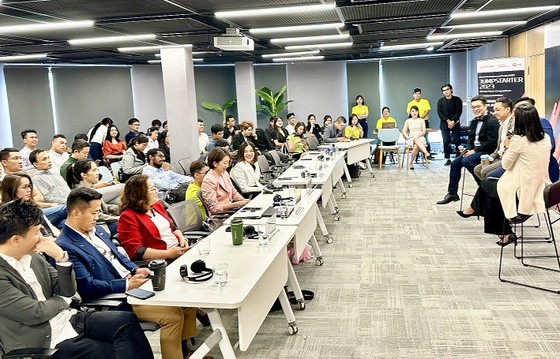 |
Alibaba Group is introducing many programs to support Vietnamese startups at the beginning of this April |
The innovative startup ecosystem in HCMC was established in 2016. Since then, there have been 34 startup incubators/support organizations, 10 common working spaces, 60 investment funds, and the participation of more than 100 universities, 250 experts. For the last 5 years, various innovative startup contests have been held to honor 250 excellent projects out of 2,000 contestants.
Among them, Speedup has been the most prominent support program for innovative startups. It has received 242 projects since 2017, and has been able to help 61 startups. Deputy Head Phan Thi Quy Truc of the Technology – Technology Market Office (HCMC Science and Technology Department) informed that in 2023, Speedup is going to prioritize the fields of AI, technologies for the public sector, blockchain, healthcare, and education. Join in Speedup, businesses receive financial aid of VND2 billion (US$85,300) at most for no more than two years to develop their projects via incubators, startup boosting centers.
Director of HCMC Science and Technology Department Nguyen Viet Dung cited experts’ comment that HCMC is leading the country regarding startup activities. As the global economy is facing depression and giant corporations are laying off laborers, the international startup community is being negatively influenced. Therefore, the national one is called upon to cooperate in seeking new chances to attract more foreign investments.
HCMC has joined in the project ‘Supporting the National Innovative Startup Ecosystem until 2025’ by providing help for 300 projects, 100 businesses including 20 that successfully attract money from venture capitalists, along with contract signing with at least 3 prestigious startup ecosystems in the world. To achieve that goal, the city has adopted several solutions like aiding domestic investors and startup businesses to approach global markets through Vietnamese commercial representatives in other countries.
Particularly, Saigon Innovation Hub (SIHUB) – one of the popular organizers for innovative startup activities in HCMC – has continuously held programs to help national startups seek international partnerships. Some of such useful programs are the collaborative incubation program with EXPARA (Singapore), the technology transfer program between Vietnam and the Republic of Korea named B2B Matching, or the contract signing with large partners from RoK (such as Shinhan Future’s Lab).
At present, investments in Vietnamese startups are negatively affected by quickly increasing interest rates globally and by unstable markets. Therefore, venture capital activities would not be a favorable choice this year. Vietnamese startups should flexibly find their own ways to attract large foreign capital volumes.
Director Nguyen Viet Dung stated that capital attraction to Vietnamese startups is still not as high as the one to international counterparts like India. As a result, HCMC plans to use global connection programs to draw more money to domestic innovative startup projects.
HCMC now has nearly 2,000 startups. 65 percent of that belongs to the IT field, followed by hi-tech agriculture and food processing at 21 percent and biotechnology – pharmaceutical chemistry at 11 percent.
























